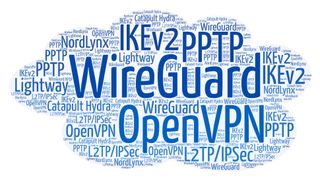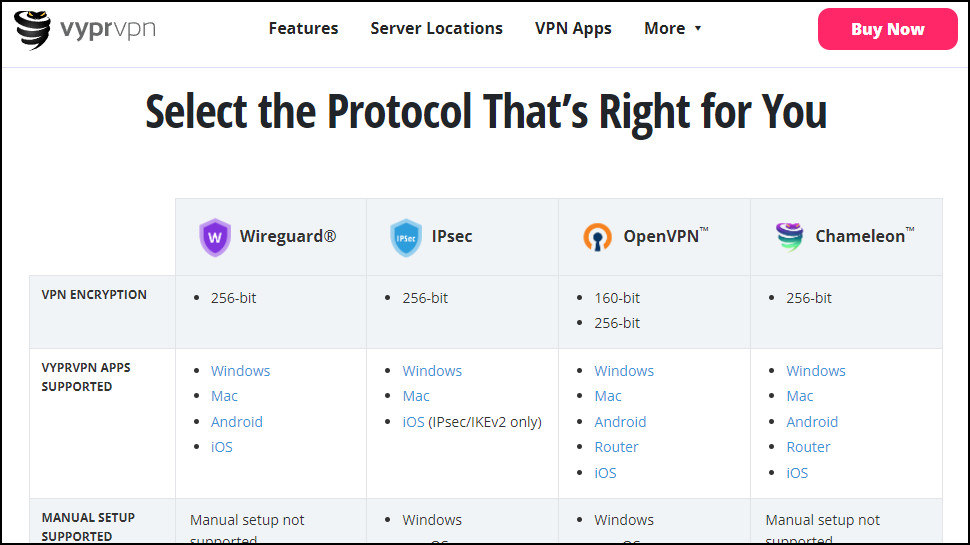What is a VPN protocol?
What is a VPN protocol?

Using a VPN doesn't require a lot of technical know-how. Launch app, click Connect, and a few seconds later your internet traffic is encrypted, and you're protected from snoopers. Easy.
Browse the app menus or your VPN's website, though, and y'all'll come beyond more technical details. In detail, you'll read about VPN protocols, and how important they are to keeping you rubber.
Many providers weigh this topic downwards with so much jargon and geek-level network-speak that information technology's tempting to just close the browser tab, and move on. Only it doesn't have to be that way. You don't need to exist any kind of expert to sympathize the protocol basics, and learning just a few central details can make a real difference to your VPN experience.
VPN protocol basics
A VPN protocol is a set of instructions a VPN app and server use to set up a connection, and so securely communicate with each other.
The protocol defines how the app logs into the server; how the server proves its identity to the app; the methods used to send data in each management, the encryption used, and every other attribute of how your VPN connection works.
Your choice of protocol often has a major result on the VPN. Nosotros've seen connection times drib from twenty seconds to less than 1, but by swapping protocols, and overall speeds might be ii or 3 times faster with 1 protocol than another.
There are less visible furnishings, too. Take your security, for example. Modern protocols typically requite you lot industrial-strength protection, but a few older options are so outdated that they should be avoided at all costs. Learning which to utilise, and which to ignore can save you lot a lot of problems later.

Which VPN protocols are available?
VPN apps typically offer a choice of several protocols. These are some of the about mutual options.
OpenVPN
OpenVPN is a popular protocol, available from virtually providers, and it'southward like shooting fish in a barrel to see why. Information technology's secure, fast and highly configurable. It's open source, which ways anyone can look at the lawmaking to confirm information technology works equally promised. And it'due south supported by mobiles, desktops, routers and only most every other device type, then you can be certain it'll run most anywhere.
WireGuard
WireGuard is the new VPN protocol on the cake with a more stripped back pattern. It doesn't have a fraction of OpenVPN's features, but WireGuard still does more than most people will ever need, and its leaner approach delivers some of the fastest VPN download speeds around. Indeed, our reviews ofttimes show WireGuard connections are ii to three times faster than OpenVPN.
IKEv2
IKEv2 is a Microsoft and Cisco-adult protocol which offers strong security, and works well on both desktops and mobile devices. But although in theory information technology should be speedy, our functioning tests commonly find information technology's significantly slower than both WireGuard and OpenVPN.
L2TP/IPSec
L2TP/IPSec is an older, simpler VPN protocol. Information technology'southward widely supported on many device types, but it can be irksome, and doesn't accept whatsoever special features to help it featherbed VPN blocking or become through firewalls.
PPTP
PPTP has been around for more than 30 years, making it one of the oldest VPN protocols. It runs almost everywhere, and the lack of features makes it relatively fast. Just information technology's so insecure, with several known vulnerabilities, that nearly VPNs accept dropped it from their lineup.

What are proprietary VPN protocols?
Some of the best VPN providers have custom protocols of their own.
ExpressVPN has developed Lightway, for instance; NordVPN has a protocol called NordLynx, and Hotspot Shield'southward offer is Catapult Hydra.
These are ordinarily fast and very secure (NordLynx is an adapted version of WireGuard we discussed above), simply there are down sides, too. Although Lightway is open up source, NordLynx and Catapult Hydra are not, and then in that location'due south no way for experts to verify how they work. And considering these are proprietary protocols, they're not supported by other providers or device manufacturers. You can only use them via the provider's ain apps and hardware.
Which protocol is best?
There's no single protocol that all-time covers everyone, in every state of affairs. But following a few general rules can get you good results.
Many VPN apps take an 'Automatic' setting, which tells the app to choose the all-time protocol for you. Get out this on and you're unlikely to accept any bug.
If yous're selecting a protocol manually, and your provider has a custom protocol such as ExpressVPN's Lightway, so that volition typically get you lot the all-time performance.
Working down the listing, WireGuard is likely to deliver excellent speeds, with OpenVPN next, and IKEv2 third. All are very secure.
L2TP isn't a keen performer, but it'south enough to protect your web banking, shopping and other sensitive activities.
PPTP, past comparison, has weak encryption and is unremarkably best avoided. But if you don't care about security or privacy - you lot're using your VPN for Netflix or unblocking some other website, for instance - and there'south no other option available, information technology might, just almost, be expert enough.
Source: https://www.techradar.com/vpn/what-is-a-vpn-protocol
Posted by: gibbonsnamonsiver.blogspot.com


0 Response to "What is a VPN protocol?"
Post a Comment